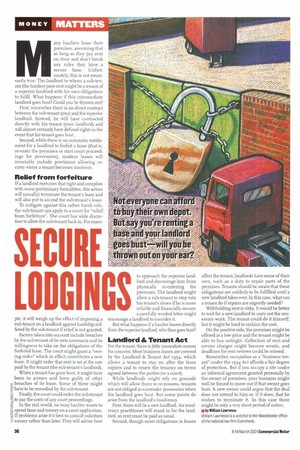any hauliers lease their premises, assuming that as long as
Page 38

If you've noticed an error in this article please click here to report it so we can fix it.
they pay rent on time and don't break any rules they have a secure base. Unfortunately, this is not necessarily true. The landlord to whom a sub-tenant (the haulier) pays rent might be a tenant of a superior landlord with his own obligations to fulfil. What happens if this intermediate landlord goes bust? Could you be thrown out?
First, remember there is no direct contract between the sub-tenant (you) and the superior landlord, Instead, he will have contracted directly with his tenant (your landlord) and will almost certainly have defined rights in the event that his tenant goes bust.
Second, while there is no automatic entitlement for a landlord to forfeit a lease (that is, re-enter the premises Or start court proceedings for possession), modern leases will invariably include provisions allowing reentry where a tenant becomes insolvent.
Relief from forfeiture
If a landlord exercises that right and complies with some preliminary formalities, this action will (usually) terminate the tenant's lease and will also put to an end the sub-tenant's lease.
To mitigate against this rather harsh role, the sub-tenant can apply to a court for "relief from forfeiture". The court has wide discretion to allow the sub-tenant back in. For exam
ple, it will weigh up the effect of imposing a sub-tenant on a landlord against hardship suffered by the sub-tenant if relief is not granted.
Factors taken into account include breaches by the sub-tenant of its own covenants and its willingness to take on the obligations of the forfeited lease. The court might grant a "vesting order" which in effect, constitutes a new lease. It might order that rent is set at the rate paid by the tenant (the sub-tenant's landlord).
When a tenant has gone bust, it might have been in arrears and been guilty of other cc breaches of its lease. Some of these might E have to be remedied by the sub-tenant.
E, Finally, the court could order the sub-tenant LT, to pay the costs of any court proceedings.
g In the real world, no busy haulier wants to spend time and money on a court application.
If problems arise it's best to consult solicitors t sooner rather than later. They will advise how to approach the superior landlord and discourage him from physically re-entering the premises. The landlord might allow a sub-tenant to step into his tenant's shoes if he is more reliable and financially secure; a carefully worded letter might encourage a landlord to consider it.
But what happens if a haulier leases directly from the superior landlord, who then goes bust?
Landlord & Tenant Act
For the tenant, there is little immediate reason for concern. Most business leases are covered by the Landlord 8E Tenant Act 1954, which allows a tenant to stay on after the lease expires and to renew the tenancy on terms agreed between the parties (or a court).
While landlords might rely on grounds which will allow them to re-possess, tenants are not obliged to surrender possession when the landlord goes bust. But some points do arise from the landlord's insolvency.
First, there will be a new landlord. An insolvency practitioner will stand in for the landlord, so rent must be paid as usual.
Second, though most obligations in leases affect the tenant, landlords have some of their own, such as a duty to repair parts of the premises. Tenants should be aware that these obligations are unlikely to be fulfilled until a new landlord takes over. In this case, what can a tenant do if repairs are urgently needed?
Withholding rent is risky. It would be better to wait for a new landlord to carry out the necessary work. The tenant could do it himself, but it might be hard to reclaim the cost.
On the positive side, the premises might be offered at a low price and the tenant might be able to buy outright. Collection of rent and service charges might become erratic, and deadlines for rent reviews could be missed.
Remember, occupation as a "business tenant" under the 1954 Act affords a fair degree of protection. But if you occupy a site under an informal agreement granted personally by the owner of premises, your business might well be forced to move out if that owner goes bust. A new owner could argue that the deal does not extend to him or, if it does, that he wishes to terminate it. In this case there might be only a very short period of notice.
• by William Lawrence William Lawrence is a solicitor in the Manchester office of the national law firm Eversheds.
































































































